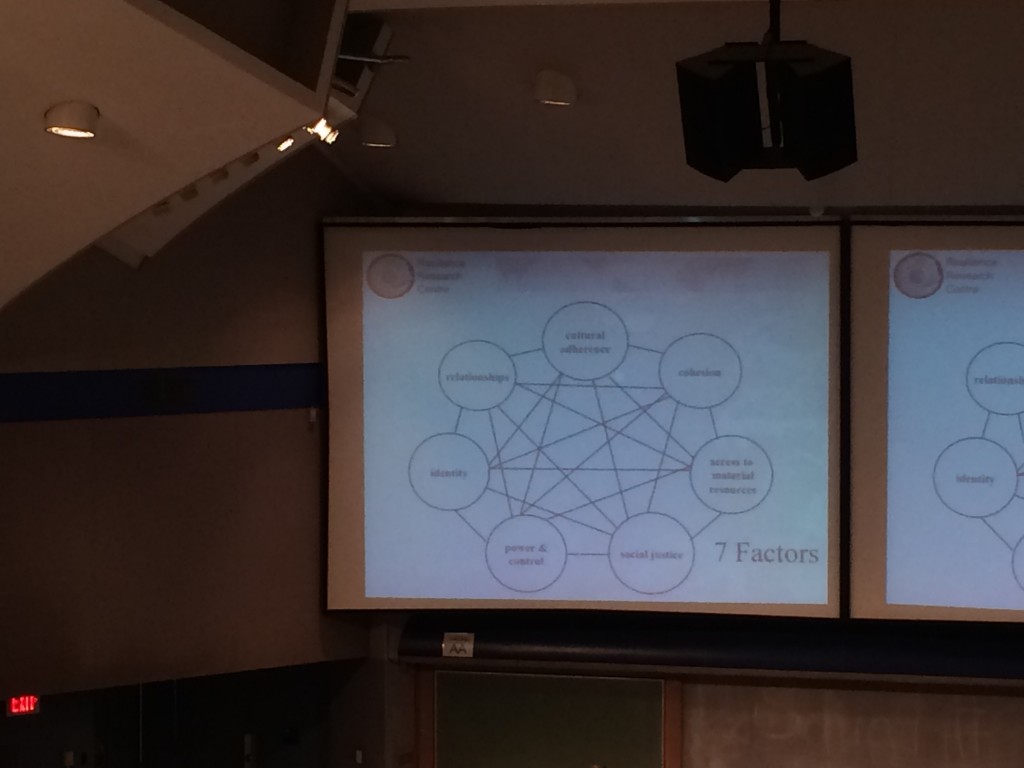This year’s UBC Advising Conference kicked off with a keynote from Dr. Michael Ungar, who spoke on “Nurturing Resilience Among Students Experiencing Adversity.”
Here are my key takeaways from his impressively captivating and informative talk:
- We are not trying to create “resiliency” within students, but can manipulate external factors that help students “be more resilient.” We shape environments that enable students to better cope with adversity.
- Psychological resilience means having the capacity to navigate and negotiate, in culturally meaningful ways, what a student needs when they experience adversity.
- Culturally meaningful is very important. What might seem “weird” to us, might be a very culturally acceptable form of coping.
- There are seven factors that contribute to resilience.
- Relationships (Social Capital)
- (Sense of) Identity
- (Sense of) Power and Control
- Social Justice
- Access to Material Resources
- (Social) Cohesion
- Cultural Adherence (Sense of connection to one’s culture)
- One cannot intervene in only one factor, but must balance all SEVEN.
- Resilience is cumulative. As resources are added to someone’s life, the impact begins to snowball.
- Context and culture influence what matters most. The messages a student might be receiving have a cultural context. For you to help a student negotiate a solution, you must understand the cultural context.
- In the long-term, not all adaptations are advantageous. What might work for the situation of undergrad, might not be advantageous at another life-stage.
- MOST IMPORTANTLY, collaborative efforts between units are more effective at building resilience than a “hopscotch-service-provision.” Meaning, students want to speak to one person and have that person stick with them through all of the services they might access. He actually said, “Stop flooding students with services.” More doesn’t necessarily produce better outcomes.
I heard Dr. Ungar’s last point as a challenge to UBC. It implies that there is no wrong person for a student to talk to, and when we refer them to other services, it is in the student’s best interests not to just hand them off. This will require elevated levels of collaboration between units.
His keynote was a strong affirmation that the mid-level plan for intercultural understanding is focused on the right things. If wellbeing is the end-goal of intercultural understanding, then all of this is relevant. Goal 1 of the plan is “fostering a culture of dynamic interaction”, which is a wordy way of saying creating an environment where students can more freely have high-quality peer relationships and more meaningful relationships with faculty and staff.
Intercultural understanding is also key to understanding the context that affect the seven factors. And a more collaborative approach, expressed as “connecting the dots” is also one of the goals of the intercultural mid-level plan.
My closing reflection was a few simple questions: How do we share this learning and knowledge about resilience with faculty? Is this applicable in ensuring the wellbeing of faculty and staff?
Thank you to Carol Naylor, Daren Fernandez and all the folks on the 2014 UBC Advising Conference Planning Committee for putting on a great conference! It was amazing to see all the advising community come together and express their passion for supporting students.
More details about the keynote
Keynote Speaker: Michael Ungar, Ph.D.
Nurturing Resilience Among Students Experiencing Adversity, Hebb Theatre, 9am – 10:10am
Resilience is a process that advisors and educators in higher education can influence positively. While many students experience exceptionally high amounts of stress that can cause anxiety, depression, suicidality, and disengagement, it is possible to nurture the factors associated with resilience when young adults face adversity.
In this presentation, Dr. Michael Ungar will share seven factors that have been shown to predict resilience across cultures and contexts. Based on both his clinical practice and research in more than a dozen countries, he will show how relationships, a powerful identity, experiences of power and control, social justice, material security, a sense of cohesion and belonging, and cultural adherence can dramatically change a student’s ability to cope when stressors pile up.
Using case studies and results from his research, Michael will explore practical ways those working with young adults can help them improve their capacity to cope.


